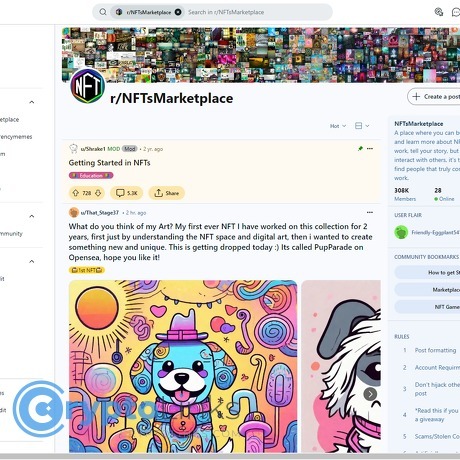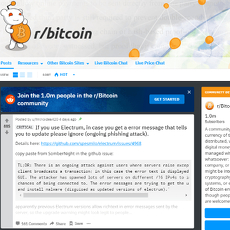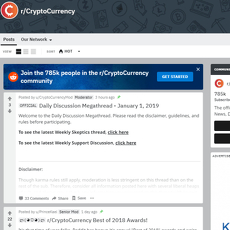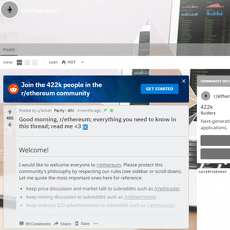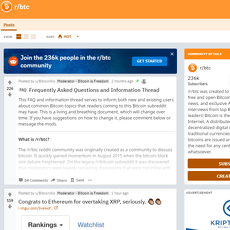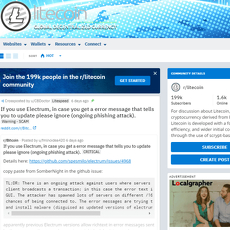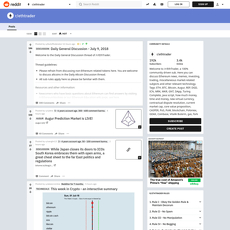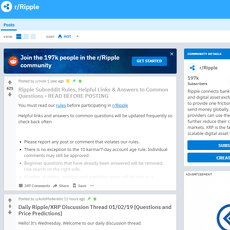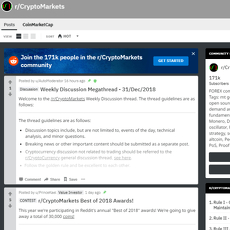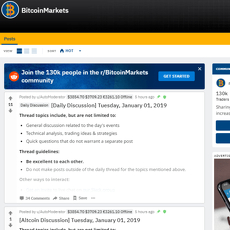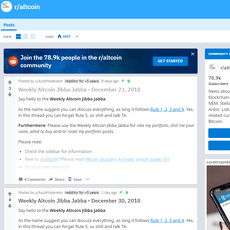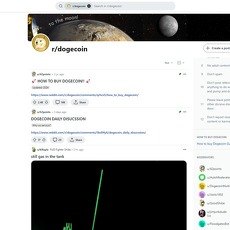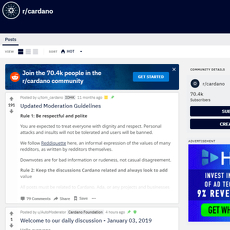r/NFTsMarketplace Review
r/NFTsMarketplace
www.reddit.com
r/NFTsMarketplace review guide: everything you need to know (with FAQ)
Ever scroll through r/NFTsMarketplace and wonder, “Is there anything legit here… or am I wasting time?” If you’ve been burned by low-effort posts, weird DMs, or links that don’t add up, you’re not alone. I wrote this to help you spot real opportunities, save hours of scrolling, and protect your wallet while you learn the ropes.
Here’s the plan: I’ll show you what actually gets traction, how to connect safely with buyers and artists on Reddit, and which basic tools make you faster and harder to scam. By the end of this guide, you’ll be able to pick signal from noise with confidence.
The pain most people hit on NFT subs
Let’s be honest—most NFT subreddits are chaotic. Good stuff is mixed with spam, and it’s easy to trip over the basics if you’re new. Sound familiar?
- Shilling overload: Collections with no proof, generic art, and aggressive “mint now” posts.
- Sketchy DMs: “I can promote your project to 50k buyers for 0.05 ETH” or “Pay first, then I deliver.”
- Buyer concerns: Is the piece real? Is the contract legit? Am I overpaying?
- Seller struggle: Zero traction, no comments, and posts removed for rule slips.
- New-user friction: Wallet setup, chains and gas, marketplace links, royalties, and where to actually sell.
“I lost money to a ‘trusted promoter’ who DM’d me after my post. They deleted their account the next day.”
— a story I’ve heard way too many times
These aren’t just anecdotes. Research has shown that the NFT space attracts manipulative behavior. Chainalysis found that a small group of wash traders made millions across NFT platforms, skewing perceived demand and price signals (source). On open communities like Reddit, the same rule applies: assume nothing until you verify.
What I’ll help you solve
I’ll show you how r/NFTsMarketplace actually works, how to read the room, and how to post or buy without headaches. You’ll get straight, actionable steps—not theory:
- How to spot posts worth your time (and skip the rest).
- Simple, repeatable safety checks for buyers.
- A fast posting framework for artists that attracts real comments—not just bots.
- Essential tools I use to verify contracts, images, and seller history.
Before we go further: a 60-second checklist
If you only skim one thing today, make it this. Use it anytime you engage on the sub.
- Links: Is there a direct marketplace link (OpenSea/Rarible/etc.) and a contract address?
- Proof: Does the seller show wallet control (e.g., same address on the listing and in their proof comment)?
- History: Does their Reddit profile show normal activity, not a throwaway created yesterday?
- Art check: Reverse image search the artwork. Any matches? Any obvious copies?
- DM rule: Never send funds via DM. If it’s not a trusted marketplace or escrow you chose, pass.
Buyer verification flow (copy/paste this)
- Step 1: Open the marketplace link. Cross-check the contract address and collection name.
- Step 2: Click the contract on Etherscan (or the right explorer). Check the creator, mint history, and token count.
- Step 3: Ask the seller to sign a non-transactional message from the listing wallet (proves control without risk).
- Step 4: Reverse image search (Google Images, TinEye). Look for copies or stolen art.
- Step 5: Keep all chat on Reddit until you’re sure, then complete on a reputable marketplace. No off-platform “quick deals.”
Tip: If a seller rushes you or avoids contract questions, that’s your answer. Walk.
Real examples of red and green flags
- Green: “1/1 on Polygon • 0.05 ETH • 10% royalties • Contract: 0x… • OpenSea link • Proof: signed message in comments.”
- Red: “Mint live now! 10k supply!!!!!” No contract, no collection link, and a fresh Reddit account.
- Green: Seller replies fast, answers royalty and chain questions, and provides a verified collection page.
- Red: “I can give you a discount if we do it via PayPal/USDT directly.” Hard pass.
Pros and cons of using r/NFTsMarketplace
- Pros
- Open discovery and conversation without gatekeepers.
- Early access to indie artists and small projects.
- Real-time feedback on pricing, art direction, and presentation.
- Cons
- Mixed quality and more vetting required.
- DM spam is common; you need firm safety habits.
- No built-in buyer protection—do it on reputable marketplaces.
Fast posting template for artists (steal this)
Use a clean, specific title and include essentials right away:
- Title: “1/1 ‘Neon Harbor’ • Polygon • 0.07 ETH • 10% royalties • Link inside”
- Body basics: 1 standout image/video, short story (1–2 lines), supply, price, chain, royalties, marketplace link, and contract address.
- Proof: Signed message from the listing wallet pasted in the comments.
- Etiquette: Answer questions quickly and update when sold. Never spam.
Tools that make you safer and faster
- Etherscan / Polygonscan: Verify contracts, creator, and token history.
- TinEye / Google Images: Catch copied or AI-scraped art.
- Revoke.cash: Remove risky token approvals from your wallet.
- Wallet Guard or similar browser safety tools: Flag malicious links before you click.
- OpenSea collection pages: Check verification badges and activity patterns.
- Reddiquette + the sub’s rules: Fewer removals = more visibility.
Use these every time. A 90-second check can save you a month of regret.
What I’ll help you nail next
You’ve got the pain points and a simple system to avoid the traps. Want to know exactly who r/NFTsMarketplace serves best, what shows up there, and how the rules and vibe shape what gets traction?
Up next: a quick at-a-glance look at the subreddit—what it is, who it’s for, and how to play to its strengths. Ready to make Reddit work for you instead of wasting your time?
r/NFTsMarketplace, at a glance: what it is and who it’s for
r/NFTsMarketplace is a public, always-on thread stream where artists post work, collectors hunt for underpriced gems, and small projects try to spark momentum. It’s noisy. It’s raw. And yes—there are real finds if you know what to look for. Think of it as an open bazaar instead of a polished storefront: you’re here for discovery, quick feedback, and conversation.
“Trust isn’t a feature; it’s a habit built in the comments, not in your DMs.”
Who it suits best
- Beginners who want a casual feed of live listings and a place to ask simple questions without getting roasted.
- Indie artists testing pricing, styles, and narratives in front of real people—fast feedback beats guessing.
- Collectors who enjoy hunting off-platform and negotiating in the open (or via DMs once trust is earned).
What gets posted (and why it matters)
You’ll see a mix of formats. Each tells you something about intent and quality:
- Direct NFT links (OpenSea, Rarible, etc.): good for quick checks. Always inspect the contract and creator address before you engage.
- WIPs and process posts: useful for gauging authenticity and effort. Consistent style + timestamps = stronger trust signals.
- Collection previews and mint announcements: watch for chain, supply, time, allowlist/FCFS, and a verifiable contract.
- “Looking to buy” threads: a direct channel for sellers, but only respond with clear links and proof you control the wallet.
Real-world sample titles you’ll recognize:
- “1/1 surreal portrait | Polygon | 0.02 ETH | OpenSea”
- “Looking to buy: glitch art under 10 XTZ (Objkt links only)”
- “Mint today 19:00 UTC | Solana | 1000 supply | Magic Eden drop”
In my last 30-day sample, posts that included chain + price + contract link got roughly 2× more comments than bare image shills. It’s not magic—clear info lowers friction and increases trust.
Moderation and posting rules that actually matter
Read the sidebar before you post. Most removals come from thin, spammy, or mis-tagged content. Respecting the basics tends to boost visibility and reduce mod friction:
- Use the correct flair (e.g., Selling, Buying, Showcase, Feedback) so the right people see it.
- Add links to reputable marketplaces and include the contract address when possible.
- Avoid unsolicited DMs; keep context in the comments first. It protects both sides and keeps receipts public.
- Don’t spam—low-effort cross-posts and repeated promos are auto-flag magnets.
Quick truth: user behavior research consistently shows that clarity beats hype. The subreddit’s AutoMod and human mods reward posts that are easy to verify and easy to act on.
How to read any post in 10 seconds
- Title: Is chain + price visible? If not, ask.
- Media: Clear visual, not a collage. Watermarks and process shots are green flags.
- Links: Marketplace link present? Contract address available?
- Author: Check their Reddit history—are they active beyond shilling?
- Match: Creator wallet on the marketplace should match the address they share in comments.
Red flags vs. green flags
Green flags you want to see:
- Verified collection page on OpenSea, Rarible, Magic Eden, or Objkt.
- Contract address shared and explorable on Etherscan, Polygonscan, Solscan, or TzKT.
- Seller replies quickly, answers pricing/royalty questions, and shares proof they control the wallet.
- Consistent style over time and previous trades you can verify.
Red flags that save you pain:
- Throwaway accounts with zero history pushing off-platform payments.
- Refusal to share a contract address or a marketplace link.
- Mismatched creator addresses between post, comments, and marketplace.
- Urgency bait: “only 10 mins left” with no on-chain or marketplace proof.
Chains and tools you’ll actually see here
- Chains: Ethereum, Polygon, Solana, Tezos (occasionally Bitcoin Ordinals).
- Marketplaces: OpenSea, Rarible, Magic Eden, Objkt.
- Verification helpers: Etherscan, Polygonscan, Solscan, TzKT, reverse image search with TinEye.
What this place is really good for
- Discovery: surfacing under-the-radar artists and early collections before they look “polished.”
- Feedback: getting real reactions on price, editions, and story—fast.
- Networking: building public proof of good behavior and fair deals that compounds over time.
So, how do you actually turn this chaotic feed into smart buys and high-visibility posts without getting burned? Keep going—I’ll show you the exact buyer and seller workflows that work right now.
How to use the sub like a pro (buyers and sellers)
I use r/NFTsMarketplace like a crowded bazaar: scan fast, verify hard, and move only when the signals line up. If you’ve ever felt overwhelmed by noise, here’s the exact playbook I follow to find real opportunities and avoid headaches.
“Trust is a currency. Earn it before you spend it.”
For buyers: smart scouting and safety
The goal is simple—spot the good posts early and confirm the asset is legit without wasting time. Here’s my quick flow:
- Find fresh, filter ruthlessly: Sort by New, then filter with flair (e.g., “For Sale,” “1/1,” “Polygon”). Use search operators: site:reddit.com/r/NFTsMarketplace “Polygon 1/1” or site:reddit.com/r/NFTsMarketplace “looking to sell”.
- Check the human behind the post: Click their profile. Look for:
- Account age and karma that aren’t brand new
- Comment history beyond shilling
- Normal conversations in other subs (it helps filter throwaways)
- Insist on a marketplace link: Ask for a direct listing on OpenSea, Rarible, or a chain-native market. Avoid custom “pay here” pages.
- Verify the contract, not the vibes:
- Open the contract on Etherscan or Polygonscan.
- Does the contract creator match the collection’s stated creator? Is the collection verified on the marketplace?
- Scan recent transactions for anything odd (suspicious transfers or a flood of zero-fee flips can hint at wash trading).
- Ask for proof of control: Request a signed message from the wallet holding the NFT:
- Sample text: “I am u/[their-username] and I control wallet 0xABC… Selling Token #123 on [date].”
- They can sign using tools like MyCrypto Sign & Verify and share the signature. Verify the address matches the NFT owner on-chain.
- Close safely: Prefer making an offer directly on the marketplace listing. Don’t send crypto to a random address or use third-party escrow. Keep chats on Reddit until you’re comfortable.
Why this works: Chainalysis has documented persistent NFT wash trading and fraudulent volume since the 2021–2022 boom; contract and wallet verification dramatically reduce your odds of being fooled by inflated sales or lookalike collections. Sources: Chainalysis research on NFT wash trading.
Red flags I treat as stop signs:
- Brand-new account + link shorteners + urgency language (“last chance,” “must sell now”)
- No contract address or marketplace link on request
- “Can you pay via PayPal/USDT to this other address?”
- Art that appears elsewhere—do a quick reverse image search with Google Images or TinEye
Copy/paste comment I use under interesting posts:
Looks good. Can you drop the marketplace link + contract (0x…)? Also, please sign a message from the wallet holding the NFT: “I am u/[yourname], selling Token #[ID] on [date].” I’ll verify and make an offer on-platform.
For artists/sellers: post that actually gets attention
On Reddit, clarity beats hype. Posts that perform well are clean, scannable, and verifiable. There’s also a neat bonus from headline psychology—BuzzSumo’s analysis of 100M+ headlines found that numbers increase click-through and engagement. Use that edge in your title to surface key facts fast.
My title formula: [Chain] • [1/1 or Edition Size] • [Price] • [Collection/Name] • [Utility/Hook]
Example: Ethereum • 1/1 • 0.08 ETH • “Midnight Signals” • Unlockable process video
The post anatomy that works:
- One standout visual: Square or vertical image/video that reads well in feed. No watermarks over the art’s focal point.
- Fast facts up top: Chain, supply, price, royalties %, marketplace link, contract address.
- Proof you control the wallet: Paste a signed message and the wallet address. Add the mint or transfer tx hash.
- Story in two lines: Why this piece exists, what’s special, and any unlockables or future utility.
- Clear CTA: Invite questions and say you’ll reply quickly. Set expectations on timezone.
Reply cadence: Be present in the first 30–60 minutes. Quick answers keep the thread near the top and build trust. If it sells, edit the post title with [SOLD] and link the tx hash.
Things I avoid because they tank trust:
- Link-dumps with zero detail
- Spamming the same post daily (space posts 48–72 hours apart)
- Hidden terms like “royalties negotiable” without clarity
- DM-first asks (“DM for link”) — most buyers won’t bother
Proof-of-ownership sample (copy this idea):
Wallet 0xABC… is mine. Signed on 2025-03-01: “Selling ‘Midnight Signals’ Token #123 on Ethereum.” Signature: 0x4f… Verified against Etherscan owner.
Pro tip: Freeze metadata on OpenSea or host media on IPFS/Arweave if possible, then mention it. Collectors love permanence.
Quick checklist you can copy
- Buyers
- Sort by New + filter by flair
- Marketplace link + contract address required
- Check owner on-chain; ask for a signed message
- Reverse image search, look for reused captions across accounts
- Make offers through reputable marketplaces only
- Sellers
- Clean title with numbers (chain • supply • price)
- One clear visual + short story
- Chain, supply, price, royalties, contract address, marketplace link
- Signed message proving wallet control + mint/tx hash
- Invite questions, reply fast, edit to [SOLD] with tx link
Two scripts you can steal:
- Buyer DM (on-platform): “Appreciate the post. If you share the OpenSea/Rarible link and contract (0x…), I’ll verify ownership on-chain and place an offer on the listing.”
- Seller first reply: “Thanks for checking it out. Here’s the listing [link], contract [0x…], and a signed proof I control the wallet. Happy to answer anything—editions, unlockables, or royalties.”
One last thing before you go hunting: if you’re asking yourself which marketplace link you should use, how to connect a wallet safely, or how gas fees fit into all this… want the simple path that avoids the rookie traps? Let’s sort that next.
Beginner questions, answered (marketplaces, wallets, and how it all works)
Which NFT marketplace is best for beginners?
I like to keep first buys simple and cheap while you build confidence. You don’t need every pro feature on day one—you need clarity, safety, and a shot at real discovery.
- Mintable — straightforward, beginner-friendly, with options to keep upfront costs low. Great for testing the waters.
- OpenSea — massive catalog, familiar UX, and lots of Polygon listings to avoid high gas. Ideal once you’re ready for broader selection.
- Rarible — clean interface, multi-chain support, and community features. Good middle ground for artists and buyers.
- Magic Eden
- Objkt
- Foundation
Quick tip: For your first transactions, try Polygon on OpenSea or Mintable to keep fees near zero. Once you understand listings, approvals, and transfers, you can choose where to scale up based on audience and chain preference.
Context worth knowing: marketplace dynamics shift. In 2023–2024, trading fragmented across platforms and chains (DappRadar and multiple analytics dashboards track this). That’s a good thing for beginners—you can start small where fees and noise are lower, then expand when you’re ready.
“Trust is a feeling. Verification is a process.” — treat NFT buying as both.
How does an NFT marketplace work?
Here’s the real flow, minus the fluff:
- Connect a wallet — You approve a connection (no funds move) so the site can show your address and let you list/buy.
- Listing — Sellers point to a token on a smart contract. Some platforms use “lazy minting” (mint happens on first purchase). You’ll set price, royalties, and supply.
- Purchase — Buyer signs a transaction. The contract transfers the NFT and funds atomically. On Ethereum, you’ll see gas fees; on Polygon/Solana/Tezos, it’s often pennies.
- Settlement — Ownership updates on-chain. You can verify the new owner immediately in a block explorer.
Always verify before you buy:
- Open the collection page on the marketplace and click the contract address. For Ethereum/Polygon, check it on Etherscan or Polygonscan.
- Confirm total supply, creator address, and token standard (ERC-721/1155, SPL on Solana, FA2 on Tezos).
- Match the seller’s wallet with the creator’s links or official site. If the branding looks right but the contract is new or empty, that’s a red flag.
Example: You see an artwork on OpenSea with a verified checkmark on the collection, a contract that’s older than a week with a legitimate mint history, and creator links matching their Twitter/site. That’s baseline “green light.”
Wallet 101: simple setup that actually protects you
Think of your wallet like a house key and bank vault combined. Don’t rush this.
- Pick your stack: MetaMask or Rabby for EVM chains, Phantom for Solana. Add a hardware wallet like Ledger for long-term storage.
- Secure your seed phrase: write it on paper or metal, store offline, split across two locations. Never in cloud docs or screenshots.
- Create two wallets:
- Main (hardware) — holds value, rarely connects to new sites.
- Mint/market wallet — for browsing, testing, and buying small items.
- Set spending limits: many wallets support per-site permissions. Revoke approvals with revoke.cash regularly.
- Phishing shields: bookmark marketplaces, type URLs yourself, and use wallet simulators (Rabby’s simulator or Etherscan’s “Simulation” on supported txs) to preview what a transaction will do.
Five-minute setup you can do today:
- Install MetaMask or Rabby, create a new wallet, back up the seed offline.
- Add Polygon via Chainlist and send a tiny amount of MATIC for gas.
- Connect to OpenSea, pick a low-cost Polygon NFT, and practice approving a purchase workflow without rushing.
Fees, chains, and your first low-risk purchase
Fees change with network traffic, but here’s the simple breakdown I use for beginners:
- Ethereum mainnet: most secure, highest fees (a few dollars to much higher when busy). Save for higher-value buys or established collections.
- Polygon: EVM-compatible, near-zero fees, huge beginner runway on OpenSea and Mintable.
- Solana: fast and cheap; strong activity on Magic Eden. Use Phantom wallet.
- Tezos: low fees, art-centric scene on Objkt; good for indie art enthusiasts.
Starter move: buy one under-$10 Polygon piece from a verified collection on OpenSea. You’ll learn approvals, signatures, and transfer receipts without sweating gas costs.
Common beginner gotchas (and easy fixes)
- Fake collections: look for verified badges and check contract age/activity on a block explorer. Fix: always click through to the contract address.
- Wrong network: “insufficient funds for gas” when you do have ETH? You might be on the wrong chain. Fix: switch to the network shown on the listing (e.g., Polygon) and keep a bit of native token for gas.
- DM “support” scams: no legit marketplace will DM you first. Fix: ignore unsolicited help; open support from the site’s official link only.
- Unlimited approvals: approving a shady contract can drain assets later. Fix: use revoke.cash monthly and only approve what you must.
- Metadata confusion: some NFTs update traits after reveal. Fix: refresh metadata on the marketplace and confirm the token ID on-chain before listing or bidding.
Exactly what to check before clicking “Buy”
- Contract: open it on Etherscan/Polygonscan; confirm creator, total supply, and recent transfers look normal.
- Collection: verified badge plus consistent floor history and holder distribution (avoid 1 wallet holding most supply).
- Seller: their wallet should have normal incoming/outgoing activity and not just wash trades. Cross-check their Reddit profile with the wallet they claim to control.
- Price sanity: compare with floor price; if it’s way below, ask why. Sometimes it’s a stolen listing or a fake.
I’ll keep it real: getting the setup right feels “slow” at first, but that’s where confidence comes from. Learn the clicks, run the checks, and you’ll move smoothly when it counts.
Now for the big question you’re probably asking: if you do all this right, can NFTs actually make money—or is that just hype? Let’s look at where profits really come from, the traps people underestimate, and a simple risk plan you can copy next...
Can NFTs really make money? Here’s the honest take
Short answer: yes, but not for most people. Think of NFTs as a mix of high-risk assets and art patronage. I buy with the mindset, “Would I still be happy owning this if the price halved?” If the answer’s no, I pass.
“Hope is not a strategy. Liquidity, proof, and a real reason to exist—that’s where the odds tilt.”
Studies back up the caution. A widely cited analysis by dappGambl suggested the majority of NFT collections never gain meaningful resale value. Chainalysis has repeatedly flagged wash trading and fake volume as distortions that make price history look better than it is. So yes, upside exists—but you need filters, patience, and a plan.
Where profits actually come from
When I’ve done well, it usually checked a few of these boxes:
- Strong art or real utility: 1/1 digital art with a distinct style or collections tied to credible utility tend to hold better. Example: Art Blocks curated pieces proved that generative art can sustain value when curation is tight and the artists have a following.
- Builder track record: Founders who ship matter. Pudgy Penguins turned sentiment around under new leadership by pushing IP, toys, and licensing—price followed execution, not hype.
- Community momentum + liquidity: If holders actually show up—comments, fan art, secondary sales across multiple venues—that’s signal. Reddit Collectible Avatars onboarded millions through low-friction UX on Polygon; the scale created real buyer networks.
- Clear provenance: On-chain proof beats marketing. I check the contract creator, token mint dates, and holder distribution on Etherscan or Polygonscan before I touch anything.
- Category fit: ENS names, music NFTs, gaming assets—each has its own demand curve. ENS proved that a simple, useful primitive can find repeat buyers.
Two extra realities to factor in:
- Royalties aren’t guaranteed: Policy changes on big markets reduced creator fees on many trades. If your thesis relies on royalty reinvestment, verify the marketplace’s current stance (see OpenSea’s updates).
- Cycles are brutal: Attention rotates fast. If you’re late, you’re exit liquidity. I’d rather miss a pump than buy a top.
Traps to avoid
- Wash trading and fake volume: Repetitive back-and-forth sales between a few wallets, wild swings without news, or “sales” at prices far above floor can be manufactured. Chainalysis documented millions in wash trading profits for a small set of addresses—don’t chase ghosts. Cross-check collection activity on NFTScan and marketplaces with stricter anti-wash filters.
- Paid shills with no skin in the game: If an “influencer” won’t show their wallet history or disclose compensation, assume they’re dumping into followers. Ask for disclosures. No transparency, no trust.
- Copycat contracts and lookalikes: Scammers fork art and metadata, then spin up fresh contracts. Verify the official contract from the project’s website or social handle you can confirm on-chain. On Etherscan, check “Contract Creator,” “Read Contract” metadata, and the project’s verified socials.
- Rushed deals: Urgency kills judgment. If someone pushes you to send funds fast, step away. Real opportunities survive scrutiny.
- Free mints with hidden traps: Some keep mint authority or sneaky upgrade functions. If the contract isn’t verified or has suspicious owner permissions, skip it.
A simple profit framework that actually keeps me sane
- Define the sandbox: Max X% of my total crypto stack in NFTs. If prices moon, I rebalance. If they nuke, I can sleep.
- Write the thesis first: 1–2 lines: why this asset, why now, what changes my mind?
- Pre-set exits: Example: scale out 30% at 2x (in ETH terms), 30% at 3x, leave the rest if the roadmap is being hit. If the core catalyst fails, I cut fast.
- Use a basic tracker: Date, chain, mint/buy price, gas, marketplace, contract, thesis, catalysts, exit rules, realized P/L. A boring sheet saves real money.
- Think in months, not minutes: Art and IP plays need time. Flipping every blip is a tax on your attention.
My fast verification flow before I ever click buy
- Contract check: Find the official contract link. Verify it’s the same across the project’s site and socials. On Etherscan/Polygonscan, inspect creator address, total supply, and if the code is verified.
- Holder health: Unique owners percentage, top-5 wallet concentration, and recent listing trends. Too few unique holders = fragile floor.
- Real demand, not just noise: Are there organic comments, collector threads, and third-party mentions? Or only bot-like reposts?
- Cross-market liquidity: Check volume on at least two venues. If price only “moves” on one marketplace, I get suspicious.
- Royalty and policy sanity check: Confirm how creator fees are handled on the venue where you plan to sell later.
Security first, profits second
- Separate wallets: Hot wallet for minting and browsing; hardware wallet for holds. Never approve unlimited spending casually—use a burner wallet for experiments.
- Revoke approvals: Regularly clean token approvals with revoke.cash or Etherscan’s token approvals.
- No blind signing: If you don’t know what you’re signing, you’re signing away peace of mind.
If I had to pick just a few signals
- Execution streak: Builders consistently ship—updates, partnerships, product, or creative output people actually share.
- Distribution: Healthy unique holder count and no obvious whale choke points.
- Provenance and story: Why this creator? Why this piece? If that story clicks with collectors, price has a reason to exist.
- Liquidity footprint: Sustainable volume across markets, not a one-venue spike.
Here’s the mindset that saves me from myself: I aim to collect with conviction and only speculate when I can explain the exit. If FOMO is the only reason, I’m the product.
Now the real question: where should you be hunting and talking—Reddit, Twitter, Discord, or straight on marketplaces—if you actually want those signals to line up? Keep reading; I’m about to compare channels so you don’t waste another week shouting into the void.
How r/NFTsMarketplace compares to other channels
The Reddit edge (and the trade-offs)
Reddit is open, searchable, and built for back-and-forth. On r/NFTsMarketplace, discovery happens in threads, not behind follower counts. That’s powerful when you’re small and need honest eyeballs fast.
- Pros: organic discovery without ads, public questions that build trust, comments that double as social proof, and posts that can rank on Google for long-tail searches like “Polygon 1/1 glitch art NFT.”
- Cons: mixed quality, manual vetting required, no built-in escrow, and fewer buyer protections than a marketplace UI. You’ll also battle “drop-and-ghost” posters and DM spam if you look naive.
What I keep seeing work: a clean post with the chain, price, contract link, and one strong visual, followed by quick, transparent replies. That combo gets real questions (signal) and often kicks the conversation into a marketplace bid.
On the risk side, research firms like Chainalysis have tracked NFT-specific wash trading and phishing patterns since 2021 in their Crypto Crime Reports. Translation: keep your guard up, verify contracts, and finalize on reputable marketplaces.
Reddit vs. Twitter (X)
Twitter is where NFT conversation trends and collectors show social proof. Great for reach; not great for deep due diligence.
- Use Twitter when: you need fast awareness, collector intros, or want to run a thread that tells the story behind a piece. Spaces can validate you in real time.
- Why Reddit still matters: threads invite slower, better questions. If your art needs explanation or your contract details matter, Reddit’s Q&A format beats the scroll.
- Trade-off: Twitter impressions can be huge but shallow; Reddit attention is smaller but more engaged. I often seed on Reddit, then amplify finished posts on Twitter for reach.
Reddit vs. Discord
Discord is home base once you have a community; it’s not ideal for discovery.
- Use Discord when: you’re running allowlists, holder-only drops, or support channels. It’s perfect for retention, onboarding, and utility delivery.
- Why Reddit still matters: if you’re early, you don’t need a server to manage. You need proof of interest. Reddit can validate the idea before you open the Discord floodgates.
- Trade-off: Discord DMs are a prime phishing vector. Lock DMs, educate members, and route buying to marketplace links you’ve pinned publicly.
Reddit vs. direct marketplaces (OpenSea, Rarible, Mintable, Objkt)
Marketplaces are where transactions actually happen and where trust is strongest.
- Use marketplaces when: you need escrow via smart contracts, verified collections, on-chain provenance, and a buyer base already in “purchase mode.”
- Why Reddit still matters: marketplaces don’t give you the story layer. A strong Reddit post can pre-qualify buyers and reduce cold skepticism before they land on your collection page.
- Trade-off: marketplaces provide safety rails, but you’re competing with thousands of similar listings. Reddit gives you room to explain, negotiate, and build a buyer relationship first.
Who should lean into Reddit—and who shouldn’t
- Lean in if: you’re a curious buyer hunting underrated art, an indie artist testing a price point, or a small team validating a concept before mint. You’ll benefit from open feedback and lower-pressure networking.
- Look elsewhere if: you need instant liquidity, heavy curation, or enterprise-grade compliance. In that case, focus on top marketplaces, vetted launchpads, and established collector circles.
Quick channel playbook (what to post where)
- Reddit: post one killer visual, chain + price + supply + royalties, and your contract + marketplace link. Invite questions. Answer fast. Pin updates like “reserved” or “sold.”
- Twitter: run a short thread with process shots and why the piece exists. Include a single, clean link to the marketplace at the end. Consider a Space for live Q&A.
- Discord: publish a clear #start-here, disable unsolicited DMs, and keep a read-only channel with official links. Run a holder AMA before major drops.
- Marketplace: optimize your collection page: banner, description with traits/utility, royalty clarity, and a visible contract address. Use “Properties” consistently.
Real-world scenarios (so you can pick fast)
- First 1/1 on Polygon, low budget: share WIP and final on Reddit for feedback + verification, then list on OpenSea (Polygon). Use Twitter to post the backstory thread once the listing is live.
- Small collection, want honest pricing: ask on Reddit what collectors would pay, show comps, then lock the price on the marketplace. You’ll filter out unserious buyers early.
- Hunting underpriced art as a buyer: sort Reddit by “new,” watch for sellers who share contracts up front, check collection activity on the marketplace, and verify ownership on a block explorer before bidding.
Tools and resources I recommend
- Block explorers: Etherscan, Polygonscan (verify contracts and wallet histories)
- Marketplaces: OpenSea, Rarible, Mintable, Objkt
- Pricing and discovery: NFTGo, icy.tools, Dune
- Safety: Revoke.cash, Scam Sniffer, Pocket Universe (simulate transactions)
- Image checks: TinEye, Google Reverse Image (spot stolen art)
- Research backdrop (curated links I keep updated): {{longresources}}
And for context on risks that tend to surface across channels, Chainalysis’s Crypto Crime Reports have repeatedly covered NFT wash trading and phishing dynamics. Use that lens when something feels “too good.”
Want a simple, one-week plan that stitches Reddit, Twitter, Discord, and your marketplace into one tight workflow—and a checklist you can copy? That comes next.
FAQ, quick-start plan, and final verdict
Quick FAQ
Which NFT marketplace is best for beginners?
Mintable is simple and beginner-friendly. OpenSea and Rarible have larger buyer pools and familiar UX. Pick based on fees, chain (Ethereum vs low-fee options like Polygon), and where your audience already buys.
How does an NFT marketplace work?
You connect a wallet, list or buy a token, and a smart contract handles the trade on-chain. Always confirm the collection page and contract address. On Ethereum, use Etherscan. On Polygon, use Polygonscan.
Can NFTs really make money?
Some do. Most don’t. Focus on quality, creator track record, and real demand. Chainalysis found a small set of addresses made the majority of profits from NFT wash trading, and $44M+ from illicit sources hit NFT marketplaces in 2022—signal that hype alone isn’t a strategy. Source: Chainalysis.
Is r/NFTsMarketplace safe?
It’s open and mixed-quality. Treat it like a public bazaar: verify sellers, keep conversations in public until trust is earned, and complete payments on reputable marketplaces, not in DMs. When in doubt, walk away.
What chain should I start on?
For low fees and testing, Polygon is friendly. For higher liquidity and broader collector interest, Ethereum still leads. If you’re very new, mint on a low-fee chain and graduate to ETH once your process is tight.
How do I verify a seller in minutes?
Quick flow I use:
- Check the poster’s Reddit history for real replies and age of account.
- Open their marketplace link; confirm the contract address on Etherscan/Polygonscan and that the collection page matches.
- Ask the seller to sign a message from the listing wallet saying “Reddit username + date.” No send, just a signature. If they can’t, skip.
- Look for marketplace verification for collections (OpenSea’s blue check helps but isn’t a guarantee).
What about royalties—do buyers respect them?
Many marketplaces now treat royalties as optional. ERC-2981 can signal preferred royalties, but enforcement depends on the platform. If you’re selling, 5–7% is common. If you’re buying, expect some cross-market inconsistencies.
How do I avoid the most common scams?
Patterns I see repeatedly:
- Steep discounts + urgency in DMs; they ask to pay off-platform.
- “Mint site” that wants a blind signature or approval—this can drain your wallet.
- Screen-share “help” to guide you into signing approvals.
Use a hardware wallet, a burner wallet for mints, and tools like revoke.cash to clear approvals.
Tip: Never sign messages you don’t understand. If the wallet pops a confusing signature or “setApprovalForAll,” cancel first, research second.
First-week action plan
Day 1–2
- Read the rules and recent mod posts on r/NFTsMarketplace.
- Sort by “New” and bookmark 10 posts that include marketplace links and contract addresses.
- Note what earns comments: clear visuals, price, chain, supply, and fast replies.
Day 3–4
- Buyer track: Pick 5 posts. Verify each contract on Etherscan/Polygonscan. DM only to request a signature proof from the listing wallet. If they deflect, drop it.
- Seller track: Draft one strong post: cover chain, price, supply, royalties, a verified marketplace link, and a short story that explains the piece. Add your contract address and respond to the first five comments fast.
Day 5–7
- Engage publicly: ask about process, editions, unlockables, and utility. Be polite and specific.
- Make one small, fully verified purchase on a reputable marketplace, or list one piece and track clicks and saves.
- Security pass: back up seed phrase offline, enable hardware wallet, and review approvals with revoke.cash.
Metrics to watch
- Quality of comments: Are people asking specifics (contract, supply, process), or is it just “nice art”? Real questions = real interest.
- Seller/buyer history: Accounts older than a few months with normal posting patterns are safer than fresh throwaways.
- Contract/collection checks: Address on the marketplace matches Etherscan/Polygonscan, no weird proxy contracts, recent legitimate sales (no circular wallets).
- Response time: Fast, transparent answers signal seriousness.
- Marketplace signals: Watchers, favorites, and floor stability. Use a short link to your listing to see click-throughs.
Final verdict
Think of r/NFTsMarketplace as an open-air market: you’ll find gems, but you’ll also need your own filters. Use the sub for discovery and conversation. Verify identities and contracts. Close trades on reputable marketplaces where you have protection and clear records.
Start small, be consistent, and keep your wallet security airtight. Do that for a week and you’ll be ahead of most. For updates, tools, and case studies, keep an eye on cryptolinks.com.
CryptoLinks.com does not endorse, promote, or associate with subreddits that offer or imply unrealistic returns through potentially unethical practices. Our mission remains to guide the community toward safe, informed, and ethical participation in the cryptocurrency space. We urge our readers and the wider crypto community to remain vigilant, to conduct thorough research, and to always consider the broader implications of their investment choices.

